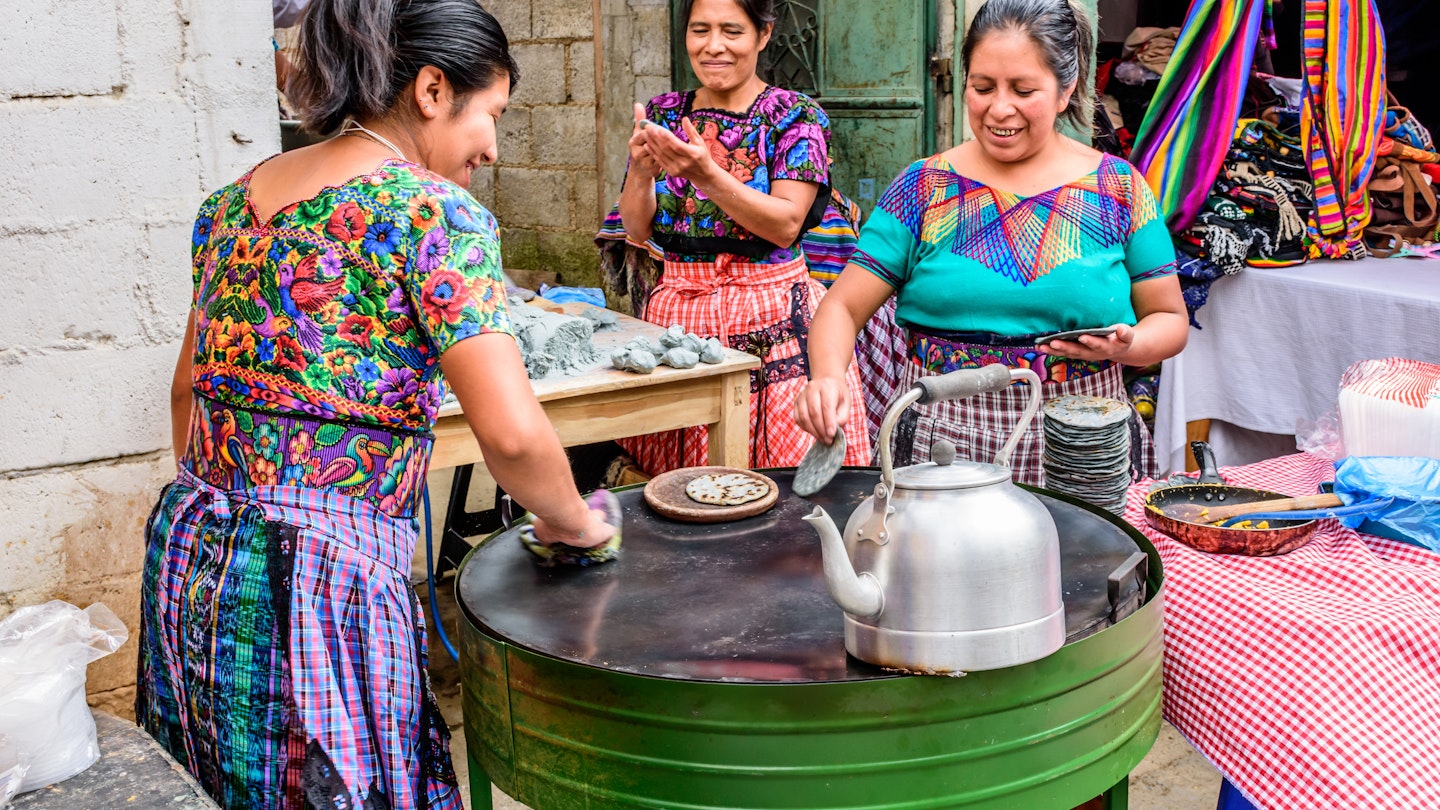Indulge in the Culinary Delights of Guatemala
Sharing a rich Mayan culture with southern Mexico, Guatemala borrows many culinary influences from its neighbor to the north. Like Mexico, Guatemala blends Spanish flavors and Mesoamerican traditions in the kitchen, drawing on celebrity indigenous ingredients such as avocados and cacao beans. The resulting fusion is everything you’d expect from Central America: vibrant chili, endless tortillas, and an array of meaty flavors.
While traveling along Guatemala’s popular tourist paths, it’s possible to find international cuisine, but doing so would mean missing out on the best culinary experiences the country has to offer. A growing number of restaurants showcase the traditional food of the Maya people, and authentic flavors can easily be discovered in hole-in-the-wall canteens frequented by locals.
The pocket-friendly street food carts that gather wherever crowds assemble contribute to the carnival atmosphere. To embark on your Mayan food journey, here are the best things to eat and drink in Guatemala.
Eat Your Fill of Tortillas
The cornerstone of any Guatemalan meal is the tortilla – a thin, round patty of cornmeal cooked on a griddle known as a comal. Tortillas in Guatemala are usually soft and flat, traditionally cooked over a wood fire, imparting a slightly smoky flavor. They can vary in color from yellow or white to an almost purple hue, depending on the maize variety used.
In restaurants, tortillas are served without limit – should you run out, simply request more (or signal your server with an empty basket). Tortillas often appear as a fundamental takeaway food in tacos, adorned with spicy chopped meat, chicken, sauces, guacamole, fish (particularly on the coast), or boiled eggs. Taco vendors eagerly board buses at every stop, ensuring snacks are always nearby.
The tostada, a fried tortilla topped with tomato sauce, guacamole, beans, and other delicious toppings, is also a must-try. Alongside it is the Salvadorean pupusa – a grilled cornmeal patty filled with beans, pork rinds, cheese, or a combination thereof, topped generously with pickled cabbage and spicy vegetables.
The variety of sauces served with tortillas is extensive; keep an eye out for pepian, a thick chicken stew made from tomatoes, chiles, ground sesame seeds, and squash seeds, and jocón, chicken simmered in a green tomatillo sauce. Don’t forget about chile rellenos – sweet peppers filled with beef and vegetables, fried in egg whites.
Experience Guatemala’s Holy Trinity: Tortillas, Cheese, and Beans
Alongside the beloved tortilla, frijoles (black beans) serve as the second mainstay of Guatemalan cuisine. These can be enjoyed boiled, fried, refried, stewed, or spread as a mash on tortillas, and they often accompany cheese and eggs. Whether served in their own dark sauce or as a thick black paste, they are both nutritious and delicious.
The third pillar of this culinary trinity is queso – local cottage cheese made from milk, rennet, or an acid like vinegar or lemon juice. Typically, a serving combines frijoles with cheese and tortillas, providing a satisfying base often accompanied by various meat and vegetable dishes.
Vegetables Balance Guatemalan Meals
In Guatemala, vegetables play a critical role in balancing meals alongside meaty toppings. They are frequently included in soups, stewed dishes, or chopped into chirmol – a zesty local salsa made of tomatoes, onions, cilantro, mint, and lime. Unique protein-rich salads such as fiambre, a mix of vegetables and cold cuts, are traditional for special occasions, while chojín incorporates radishes, mint, and crispy fried pork rinds.
Squash is a prevalent vegetable in many Guatemalan stews and soups. While various flavorful squash types are cultivated in the region, the often bland guisquil defaults in many dishes. Rice, frequently served fried with vegetables, is another common accompaniment.
Guatemala’s avocados, believed to have originated here, are a staple in guacamole, often enjoyed on tortillas and tostadas. Additionally, elote, or grilled corn on the cob with salt and lime, as well as potatoes and plantains in various preparations, are widely enjoyed. Plantains also sometimes appear in desserts as sweet rellenitos filled with bean paste.
Enjoy Paches and Tamales
A traditional food both as a quick snack and for special occasions, the Guatemalan tamale consists of a mixture of corn, rice, or potato dough blended with red bell peppers, onions, olives, raisins, and chiles, wrapped in leaves and steamed, creating a cake-like parcel.
The classic tamale is made with corn dough and wrapped in banana leaves, while the chuchito uses corn leaves, and the pache is a highland version made from potatoes, often enjoyed on Thursdays.
Drink Like a Guatemalan
Guatemalans have a fondness for cerveza (beer), rum, and licuados (fresh fruit smoothies). Gallo and Cabro represent the default beer selections, but an emerging craft beer scene highlights local breweries. The renowned Ron Zacapa is often marked as the premier rum choice. Among unique local beverages, chicha (corn beer) and cusha (a homemade corn spirit) stand out.
World-famous Guatemalan coffee is celebrated for its rich aroma, enhanced by chocolatey and vanilla notes from high-altitude plantations around Huehuetenango. Moreover, Guatemalan hot chocolate – where cocoa originated – showcases the country’s rich culture, while atol, a warm drink made from roasted corn flour and spices, offers comfort on cooler days.
Vegetarians and Vegans
Due to the occasional luxury of meat within the local diet, finding satisfying vegetarian options in Guatemala is feasible. The traditional Maya combination of vegetables, beans, and tortillas remains nutritious and filling. Requesting a lunch without meat typically ensures a meal involving soup, rice, vegetables or salad, cheese, and tortillas. However, some beans may be cooked in lard, so clarifying dietary preferences is advisable.
Nevertheless, a vegetarian Maya experience may become repetitive if one eats the same dishes daily. This is where options for diverse food experiences become essential; larger cities and tourist spots feature vegetarian and vegan restaurants, while cafes often offer varied dishes like pizza or nachos. Tostadas with guacamole consistently provide a delightful option, and Chinese restaurants often include tofu selections.
This article was first published April 15, 2016, and updated October 11, 2022.




